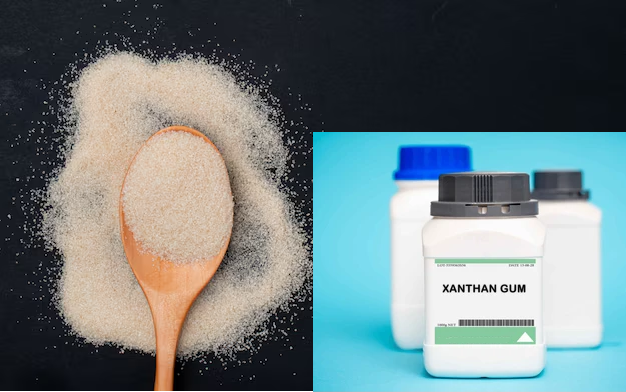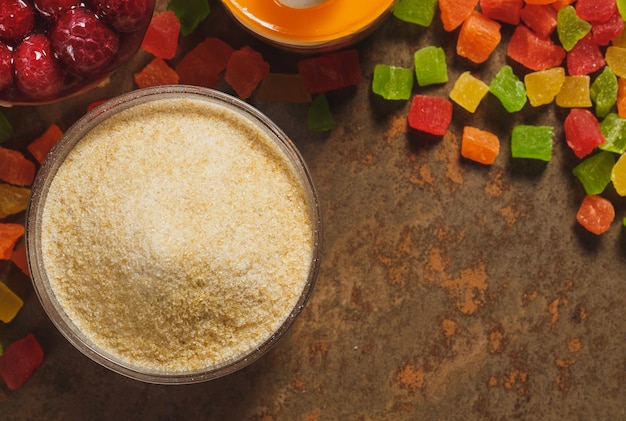-
July, 26,2025
Understanding the Role of Bloom Strength in Soft Gelatin Capsules
-
July, 25,2025
Bloom Strength and Its Impact on Hard Gelatin Capsules
-
July, 21,2025
How Gelatin Is Revolutionizing Pet Food: A Healthier Option for Dogs
-
June, 22,2025
Collagen as a Trusted Ingredient: Meeting Global Demand with Reliable Supply
Gelatin vs Xanthan: Are They the Same?
When choosing between gelatin vs xanthan gum, manufacturers often find themselves debating their functional differences and benefits. For businesses working with gelatin manufacturers, understanding the distinct properties of these ingredients is crucial. While both are used as gelling and thickening agents, they are distinct in composition, applications, and benefits. In this article, we’ll explore their key differences, discuss their suitability for various industrial uses, and determine which might be the better choice for your business needs.

Are Gelatine and Xanthan Gum the Same?
Gelatin and xanthan gum are not the same. They differ in origin, composition, and how they function in various applications. Below, we’ll dive deeper into what makes each unique.
What Is Gelatin?
Gelatin is a kind of protein derived naturally from collagen, usually originating from animal connective tissue, including skin, bones, and cartilage. It has been in use for centuries in food, pharmaceuticals, and cosmetics for its unique gelling properties that give elastic and transparent gels.
Key Characteristics of Gelatin:
- ·Origin: It comes from animals, primarily bovine or porcine sources.
- ·Functionality: It is known for its gelling, stabilizing, and texturizing properties.
- ·Usual Applications: This ingredient has extensive use in confectionery, desserts in milk, pharmaceutical capsules, and cosmetics.
- ·Health Benefits: It contains large amounts of amino acids, such as glycine and proline, which are believed to benefit skin health, joint repair, and gut health.
Funingpu specializes in producing high-quality gelatin that is tailored for various applications, from confectionery and dairy to pharmaceutical capsules. With certifications like ISO, GMP, and Kosher, Funingpu’s gelatin products are trusted by manufacturers worldwide.
What Is Xanthan Gum?
It is a polysaccharide produced through the fermentation of sugars, where corn or wheat is normally used, by the bacterium Xanthomonas campestris. Unlike gelatin, xanthan gum is entirely plant-based, making it popular for vegan and vegetarian products.
Key Characteristics of Xanthan Gum:
- ·Source: Derived utilizing microbial fermentation.
- ·Functionality: Mainly as thickener and stabilizer, not a true gelling agent.
- ·Applications: Presence in salad dressings, sauces, gluten-free baked goods, cosmetics.
- ·Health Concerns: Despite the status of xanthan gum to be widely regarded as safe, too much consumption may trigger gastrointestinal side effects for sensitive consumers. This is one of the reasons why such questions appear: "Why is xanthan gum bad for your gut?"
Gelatin vs Xanthan Gum: Key Differences
Understanding the core differences between gelatin and xanthan gum helps determine their suitability for specific applications.
|
Feature |
Gelatin |
Xanthan Gum |
|
Origin |
Animal-based (collagen) |
Plant-based (fermented polysaccharide) |
|
Functional Properties |
Gelling, thickening, stabilizing |
Thickening, stabilizing |
|
Texture |
Elastic and smooth gels |
Viscous solutions |
|
Temperature Sensitivity |
Requires heat to dissolve; sets when cooled |
Heat-stable; remains viscous under heat |
|
Dietary Suitability |
Not vegan or vegetarian |
Vegan-friendly |
|
Health Profile |
Supports gut, skin, and joint health |
Potential gut irritant if overused |
Can I Use Gelatin Instead of Xanthan Gum?
The application of gelatin instead of xanthan gum is dependent on the type of texture needed, the application area, and the target audience. Now, let's evaluate the applications and advantages of each in detail.
Applications Considerations: Gelatin vs Xanthan Gum—Which Option Is Better?
- ·In Confectionery: Gelatin really outshines as the best option, resulting in a chewy, elastic texture perfect for gummies and marshmallows. Xanthan gum can't replace it.
- ·In Sauces and Dressings: The strongest asset of xanthan gum involves the stabilization of emulsions and the prevention of separation, hence it is better for applications such as salad dressings.
- ·In Dairy Products: Both gelatin and xanthan gum give different mouthfeel characteristics to desserts. Gelatin gives a creamy texture, for example, in panna cotta, while xanthan gum imparts viscosity without a smooth, melt-in-the-mouth sensation.
Shelf Stability and Storage Needs of Gelatin vs Xanthan Gum
Gelatin and xanthan gum have special storage needs:
- ·Gelatin: Moisture-sensitive; needs to be stored in dry, cool conditions to preserve its functional properties.
- ·Xanthan Gum: Stable, with no sensitivity to changes in environmental conditions, hence easier to store for longer periods.

Funingpu’s gelatin is produced using state-of-the-art technology to ensure consistent quality and stability. Packaged to prevent moisture exposure, Funingpu products are designed to meet the rigorous demands of large-scale manufacturing.
Health Benefits of Gelatin Over Xanthan Gum
When it comes to the health effects of gelatin vs xanthan gum, gelatin certainly trumps health-conscious consumers and manufacturers:
- ·Gut Health: Gelatin helps support the lining of the gut, promoting digestion and healing. On the other hand, xanthan gum can give some people bloating or diarrhea, thus proving why one may deem xanthan gum bad for the gut.
- ·Nutritional Value: Gelatin is a source of protein and contains essential amino acids, whereas xanthan gum does not add any nutritional value to foods.
- ·Clean Label Appeal: Gelatin is a natural, recognizable ingredient; xanthan gum sounds over-processed.
Gelatin vs Xanthan Gum: Which Is Better for Industrial Applications?
From large-scale food production to niche health products, gelatin, and xanthan gum serve different purposes. Here's how they compare across key industrial metrics.
Suitability for Large-Scale Food Production
- ·Gelatin: Widely used in large-scale production due to its predictable gelling properties and versatility in confectionery, dairy, and pharmaceuticals.
- ·Xanthan Gum: Preferred for applications requiring viscosity control in the absence of heat.
Different Product Types' Performances: Confectionery, Dairy, Beverages
- ·Confectionery: The elastic and chewable texture imparted by gelatin makes it an irreplaceable ingredient in the formulation of gummies and marshmallows. Xanthan gum does not have the required elasticity for use in such applications.
- ·Dairy: In yogurt and desserts, gelatin contributes to a luxurious mouthfeel. Xanthan gum works well as a stabilizer; however, it cannot provide the same creaminess that gelatin gives.
- ·Beverages: Xanthan gum is very good at beverage stabilization function related to the prevention of sedimentation-while the gelling properties of gelatin are less well suited for this category.

Shelf Stability and Storage Requirements for Manufacturers
- ·Gelatin: Requires careful handling to avoid moisture exposure but, when properly stored, has a long shelf life.
- ·Xanthan Gum: Easier to store, though it may clump if exposed to high humidity.
Meeting Consumer Trends with Gelatin-Based Products
With the increasing demand for clean-label and high-protein products, gelatin aligns with consumer trends more than xanthan gum. Its natural origin, combined with health benefits, provides an excellent choice for food manufacturers who target health-conscious buyers.
For manufacturers looking for premium gelatin solutions, Funingpu offers tailored formulations to suit specific needs. Whether you’re producing chewy candies, creamy dairy desserts, or pharmaceutical-grade capsules, Funingpu’s gelatin ensures optimal performance and quality.
Final Thoughts
Between both gelatin and xanthan gum, each provides important functions related to food and industrial uses. However, gelatin often is the more versatile and healthful option. The unique gelling properties of gelatin, its origin from natural sources, and its nutritional benefits give it an upper hand over xanthan gum in applications from confectionery to dairy.
For manufacturers, the decision between gelatin vs. xanthan gum comes down to product characteristics and target market. Partnering with a reliable edible gelatin manufacturer ensures consistent quality and performance, which is crucial for delivering superior products. The increasing demand for clean-label, health-oriented ingredients leaves gelatin far ahead in most applications.
When choosing between gelatin vs xanthan gum, manufacturers should consider not just the ingredient’s functionality but also the reliability of their supplier. Funingpu is committed to delivering high-quality gelatin products that meet global standards, ensuring your business’s success in competitive markets.
FAQs
1. Is gelatine the same as xanthan gum?
No, gelatin and xanthan gum are different in origin, texture, and in their respective fields of application. Gelatin is an animal-derived ingredient that produces elastic gels, whereas xanthan gum is plant-derived and used mainly as a thickener.
2. Can I use gelatin as a substitute for xanthan gum?
Sometimes, yes; the results will, however, be different. Gelatin is more suited to form gels and give a chewy feel, while xanthan gum acts more in stabilization, especially in liquid-based products.
3. Why is xanthan gum bad for your gut?
Too much xanthan gum can be really bloating for many people and give one a digestive problem, especially for those who have more sensitive guts.
4. Which one is more appropriate gelatin and xanthan gum for industrial use?
Gelatin is best suited for gelling, texturizing, and clean-label appeals, whereas xanthan gum excels in thickening and stabilizing.
5. Can gelatin be used in vegan products?
No, as gelatin is obtained through animal sources, it cannot be considered vegan. However, it provides incomparable functionality for certain non-vegan applications such as confectionery and pharmaceuticals. Knowing the differences between gelatin and xanthan gum will allow manufacturers to make appropriate decisions in light of their goals for the product and market demand.
Phone: +86-577-88105990
Mobile: +86-138 5886 1938
Official Website: www.fnp-gelatin.com
Email: sales@funingpu.com
Address: No. 1-10 Wenpu Road, Yacheng Town, Xiapu County, Ningde City, Fujian Province




